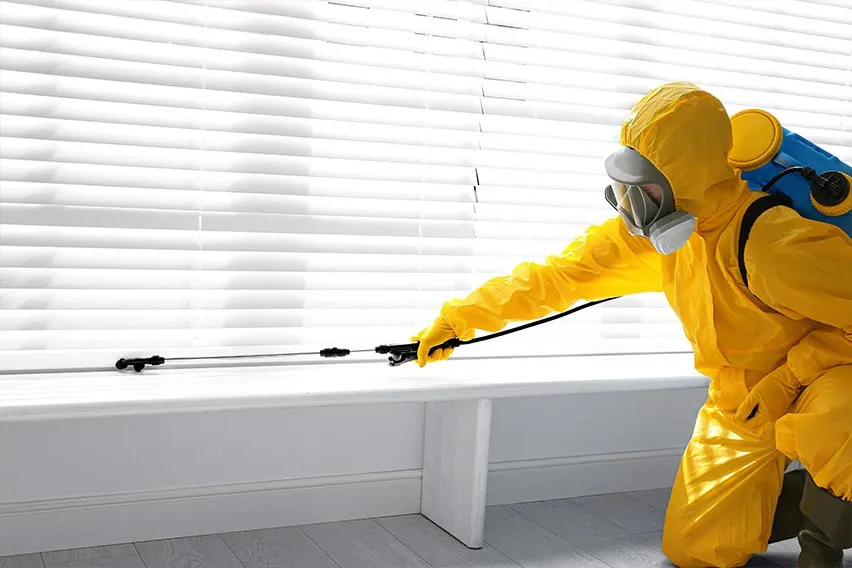Discover the Tricks of Insect Control: Just How It Functions and Process Disclosed
Pest control is a careful practice that includes a deep understanding of pest habits, strategic planning, and exact execution. From determining the origin triggers of problems to implementing tailored control actions, the process of parasite control is a blend of scientific research and method intended at preserving a harmonious setting.
Bug Behavior Comprehending
Understanding the detailed habits of insects is vital for efficient pest control management. The behavior of cockroaches, such as their preference for damp and dark environments, overviews pest control professionals in determining where to concentrate treatment efforts.
By remaining abreast of the most current research study on bug actions, parasite control professionals can constantly fine-tune their strategies and remain in advance of advancing pest populations. Ultimately, a deep understanding of bug actions is a keystone of effective bug control monitoring.

Assessment and Recognition Methods
Effective bug control monitoring counts heavily on precise examination and accurate identification approaches to accurately examine infestations and establish targeted removal approaches. Examination includes a detailed examination of the residential or commercial property to identify the extent of the insect problem, identify the type of insect present, and locate possible entrance points. This process may include aesthetically checking typical hiding spots, using monitoring devices such as catches or electronic cameras, and assessing pest droppings or damages indicators.
Identification is a crucial step that complies with examination, as different bugs need certain therapy techniques. Parasite control professionals use their proficiency and expertise of pest actions to identify the species present properly. This may involve checking out physical features, such as size, shade, and markings, in addition to studying the parasite's routines and environments. In some situations, examples may be gathered for further evaluation in a laboratory to verify the insect varieties.
Insect Control Procedures Implementation
Having actually meticulously examined and precisely determined the parasites existing, the following critical action is the application of targeted insect control steps to efficiently eradicate the infestation. Chemical therapies involve the usage of chemicals to eliminate pests, while organic controls present natural predators to take care of bug populations.
Proper execution of bug control steps requires competence to guarantee the safety of citizens and the atmosphere. When applying chemicals and to use proper protective devices, it is important to follow laws and guidelines. Surveillance and follow-up examinations are crucial to analyze the performance of the selected methods and make any essential changes. By employing targeted pest control procedures, invasions can be effectively eliminated, producing a much healthier and pest-free atmosphere.
Ecological Effect Considerations
Cautious evaluation of the possible ecological impact is a vital facet when implementing insect control procedures. Bug control techniques can have numerous effects on the setting, consisting of non-target types being impacted, contamination of dirt and water resources, and interruption of the environment. It is important to consider these factors to reduce any type of adverse effects on the setting.
To reduce ecological influences, incorporated pest monitoring (IPM) techniques are frequently recommended. IPM concentrates on using a mix of techniques such as organic control, environment control, and the targeted use of chemicals as a last resource. Pest Control Homestead. By utilizing an alternative strategy, IPM aims to manage bugs successfully while decreasing harm to the atmosphere

Ongoing Surveillance and Prevention
Constant monitoring and prevention play crucial functions in maintaining efficient insect control approaches in time. Once initial insect control measures have been executed, ongoing monitoring comes to be important to track parasite task degrees and ensure that the chosen approaches are working effectively. Regular evaluations by trained professionals enable for the early detection of any signs of parasite resurgence, enabling quick activity to be taken prior to have a peek at these guys the invasion intensifies.
Safety nets are just as crucial in maintaining a pest-free environment. Carrying out techniques such as securing access points, maintaining sanitation, correct waste monitoring, and minimizing sources of food and water deprive pests of the fundamentals they need to flourish. By proactively attending to these aspects, the chance of a bug problem is substantially lowered.
Moreover, safety nets add to the long-lasting success of parasite control initiatives, decreasing the requirement for responsive therapies and associated expenses. By incorporating ongoing surveillance and avoidance right into a comprehensive insect monitoring strategy, organizations and people can successfully guard their homes versus unwanted intruders.
Final Thought
To conclude, pest control involves understanding insect behavior, conducting comprehensive inspections, executing control procedures, taking into consideration environmental influences, and keeping ongoing monitoring and avoidance. By complying with these steps, parasite invasions can be successfully managed and regulated. It is necessary to take a proactive technique to pest control to protect both why not try this out human health and the setting.
By remaining abreast of the most current research study on bug actions, insect control experts can continually refine their methods and stay ahead of developing insect populaces.Having actually thoroughly examined and properly determined the bugs existing, the next important action is the execution of targeted insect control procedures to properly get rid of the problem.Additionally, selecting eco pleasant parasite control items and methods can considerably decrease the eco-friendly linked here impact of pest management techniques - Pest Control Homestead. When first bug control procedures have been implemented, recurring surveillance comes to be essential to track parasite task levels and ensure that the selected techniques are functioning effectively.In conclusion, insect control entails understanding pest behavior, conducting extensive evaluations, implementing control procedures, considering environmental influences, and maintaining recurring monitoring and prevention
Comments on “Custom-made Pest Control Homestead Program for Optimum Security”